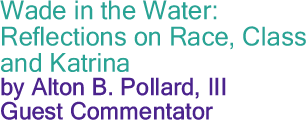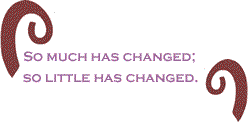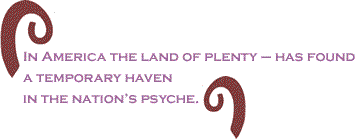
|
|||||||||||||||||||||
|
More than forty years have passed since James Baldwin first tried to reason with white people in the land of his birth to learn to “put yourself in the skin of a black person” (no less a poor person, gay person or any one of the multitudes of the nation’s disinherited). The words are taken from his famous text “The Fire Next Time,” the title of which is in turn drawn from a prophecy recreated from the Bible among the community of Africa’s enslaved children in North America:
The meaning of this ancestral message from antebellum era America and segregated America in sad respects remains the same in September 2005. So much has changed; so little has changed. We have gone forward; we have stepped backward. We are in motion; and yet we are very much standing still. In between these several poetic assertions lies the complex and shaded truths about the state of race, ethnicity and social class in our country.
The aftermath of Hurricane Katrina is a propitious time for us to take stock of where we are as a nation, region, city, school, citizens, to do some civic inventory and assess our public policies and priorities. The passing of Katrina has become a natural documentary on the fortunes of black, brown and white, rich, middle class and poor, the margins and the center, the children, the aged, and infirm, the haves, the have-nots and the never-are-supposed-to-haves in this land. When the fierce winds of nature’s fury joined with the gigantic tides of the Gulf to bring further erosion to the wetlands, and when the creaking walls of antiquated levees finally gave way in the city unable to hold the flood waters back any more, those who managed to survive in convoys, terminals, hospitals, dorm rooms or wherever and without benefit of outside aid for a time, gathered in places near and far with family and friends and strangers to celebrate the miracle that they are yet alive. The silver lining in the cloud is this: the all too tenuous lease on life had by so many – in America the land of plenty – has found a temporary haven in the nation’s psyche, philanthropy and nonpartisan goodwill. In truth, the race and class-based abandonment of untold thousands to disparity, disease, despair and death began long ago in pre-hurricane New Orleans. Number one among the five cities with the highest concentration of urban poor in the United States (and lest we congratulate ourselves too fast, Atlanta is also high on the list), the Crescent City is no different than any other American urban enclave, when it comes to a nation unwilling to live out its creed. New Orleans is two-thirds black, with 50% of that 67% living below the poverty line. In this tourist destination city, living wages are hard to come by for workers held captive to the substandard pay of service driven industries. Environmental hazards prevail in the city’s submerged and 98% black Ninth Ward, which has long been ground zero for toxic exposure of people to the Mississippi River chemical corridor. While more than $400 billion has been spent on an unjust war in Iraq (more than $5 billion a week and counting), our government has scarcely approved one-eighth this amount for the entire Gulf Coast catastrophe to date. Our national predilection for disparity, our festering inequalities and destructive priorities, have affected and infected St. Bernards and Jefferson Parish, Biloxi, Moss Point, Pascagoula, Mobile and thousands of communities from coast to coast.
It has been said by many that better planning and response by local, state and federal authorities could have lessened the severity of the hurricane’s impact. Perhaps. But the just and moral exercise of power before the winds and waters came would have done far more to stem the disproportionate suffering. Greater redress and resistance against the terrors of tyranny on the part of blacks and browns, the poor and the working poor, and progressive-minded women and men is now called for. In seasons of relative economic prosperity and peace, the persistence of racism can lie so subliminal and fallow, as to escape clear and obvious detection by those who desperately want to believe the social fabric is not already rent. A former professor of mine was fond of saying that life has always been cheap in America, and black life is the cheapest of all, for what we value most about persons in this land is never their humanity, but their utility. We have artfully developed techniques in race and class relations management, relegating “unacceptable” women, men and children to back alleys, underpasses, projects, ghettoes, shelters, jails, prisons and other carefully controlled and shadowed spaces. In a complex society like ours, it is well understood that no individual has power except to the extent she discovers a body of sentiment for her own ideals and values for which she can marshal further support. The Adolf Hitler’s, Osama ben Laden’s, Edgar Ray Killen’s, David Duke’s, Eric Rudolph’s, and Saddam Hussein’s are not solitary or exceptional examples of bigotry, tyranny or racism in our world. New Orleans is our Afghanistan. The Gulf Coast is our Iraq. Crime and violence were there before and during Hurricane Katrina because the violation of people has long been endemic in our land. Racism is second nature to us. It is the American way of life. The tragedy of our time is that whether one is personally a racist or not is increasingly inconsequential, because it is our “silent consensus,” “neutral nonconcern,” and “outward conformity” on matters of race, class, gender, sexuality and more which institutionalizes hierarchy, division and disdain and is now the given that entraps us all. Justice and righteousness will have their day and at the expense of an illusory domestic tranquility. As the floodwaters recede, let us raise our voices. Let us dare to hope. No, let us do more. Let us dedicate our very lives to the remaking of America. In my mind’s eye, I catch a glimpse of the possible in one of my favorite Spirituals: “Wade in the water. Wade in the water children. Wade in the water. God’s gonna trouble the waters.” Alton B. Pollard, III is Director, Program of Black Church Studies and Associate Professor of Religion and Culture at Candler School of Theology, Emory University. He can for reached at [email protected]. |
Your comments are always welcome. Visit the Contact Us page to send e-Mail or Feedback or Click here to send e-Mail to [email protected] e-Mail re-print notice
If you send us an e-Mail message we may publish all or part of it, unless you tell us it is not for publication. You may also request that we withhold your name. Thank you very much for your readership. |
| September 22 2005 Issue 151 |
|||||||||
|
|||||||||
|
|
|||||||||
| Printer Friendly Version in PDF format. Download free Adobe Reader. | |||||||||
 |
|||||||||
 |
|||||||||
| |
|||||||||
| |
|||||||||



























